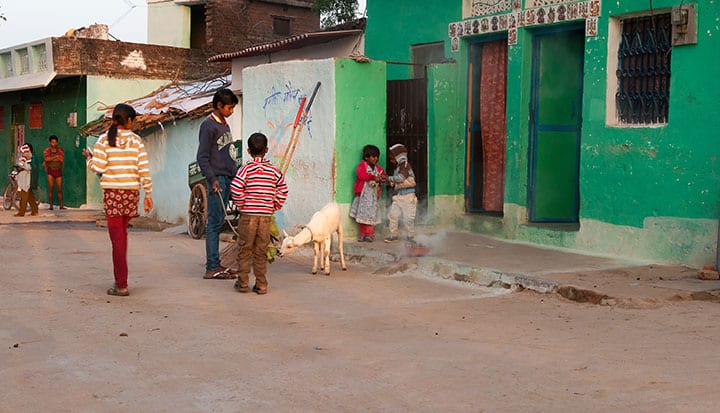“What are you looking forward to most about Delhi?” I asked my kids, as we sat together at Heathrow before our flight. “Coming home!” answered Danny. It was the UK school half-term. Instead of our usual jaunt to the coast or to an adventure park, we were heading as a family of five to the slums of Delhi. Sure, this was off piste and potentially risky, but something my wife Gillian and I really wanted to do. At best our children weren’t sure. At worst they hated the idea, were embarrassed by it and wished their parents were normal.
We went to spend some time with an Indian organisation called Asha which works in slum communities to promote better health and education outcomes. We were helping to run a 1-week children’s programme – things like arts & crafts, music, language .
Asha was set up by Dr Kiran Martin, a passionate and articulate paediatrician who moved from Mumbai to Delhi when she was a child. She started on her own nearly 28 years ago in one slum with a table and a stethoscope, and bags of purpose and good intent.
She now has about 80 employees, 2000 community volunteers and a deep footprint across 60 of Delhi’s 200 slums, impacting the lives of over half a million slum dwellers. She’s also just released a CD of her singing classical Indian songs, so she’s by no means a one trick pony.
Kiran Martin with young women from the Delhi slums (left) and, in 2002, receiving the Padma Shri, one of India’s highest civilian awards (right).
I had very low expectations of what my children – Danny (14), Grace (12) and Eve (7) – would get from this trip. They’re just normal, western, screen-loving kids. They’re into their friends, their brands and their social media. They’re not particularly concerned about social justice. That’s for adults or kids who aren’t cool. I didn’t really expect them to enjoy it. I hoped they’d remember it, and maybe even learn something from it. But I wasn’t expecting any epiphanies.
That’s us in Asha’s small centre in Zakhira slum – Danny, Gill, Grace and Eve.
In terms of the children, I guess I’ve seen both differences and similarities played out between our kids and those from the slums. The differences are obvious: shelter, security, health, education, food, clothing, gadgets, ‘stuff’, money – all distributed with massive unevenness between them and us. It’s random and wrong, and deserves ruthless challenge by everyone with a heart and a head.
Some of the brilliant children we spent time with from Zakhira slum in South Delhi.
But there were lots of similarities too. For example, we met a great bunch of students in the Seelampur slum in East Delhi. They were articulate, intelligent and appropriately respectful. However, they were also great ‘craic’ (as we say at home). For example, one of the students, Afzal, sang a traditional Hindi song for us. It was brilliantly delivered; the other students knew that. But it didn’t stop them being cheeky about it. It established a connection with Danny and Grace. Yes, ours were normal kids. But so were the slum children. Being a kid and cheekiness are universals.
That’s our Eve playing with other 7 year olds in Zakhira slum (left), and Danny and Grace with some of Asha’s college students in Seelampur.
In terms of the wider work of Asha, I was very encouraged. My day job with PwC involves working for the UK’s Department for International Development (DFID) on a big programme called the Girls’ Education Challenge. So I’ve seen lots of activity in education and social development in similarly impoverished environments, mostly in sub-Saharan Africa. And I’ve seen, I have to say, the good, the bad and the ugly.
In this context, Asha has clearly nailed some of the key components of successful development work. In particular, the whole endeavour is based on strong trust and deep relationships between Asha and residents and stakeholders in the slum communities. You can’t magic up trust and relationships. They need to be grown and nurtured over time. Asha has clearly done this, and this means it has permission to be there and do the good that it does.
Asha Staff and Community Volunteers in Zakhira slum.
I introduced Kiran to my colleagues Ranen and Kaustabh who work for PwC in Delhi. So we all got together over chai (India sweet tea) in Asha HQ to talk about its business internship programme. The programme helps place slum kids who are at college into businesses over the summer. It’s worked really well for organisations like Rio Tinto and the British High Commission, and has received huge endorsement from the Indian Government. And if the sample of kids I met are anything to go by, it’s a great programme and adds a lot of value to the students and the businesses who get involved.
This has been a half term with a difference. Gillian and I are proud of our three children for getting stuck in in Delhi, and I’m sure at some stage in their more reflective moments they’ll admit to the benefits. Even now our youngest, Eve, talks fondly about the friends she made, and our middle girl, Grace, is openly talking about going back again and taking some of her good friends from Belfast. It has also really buoyed up my personal enthusiasm for Asha. Having the privilege to see first-hand some of their great work has encouraged me to broaden and deepen any support I can offer from a distance.
David Armstrong is a Partner in PwC. He leads PwC’s Economics & Policy team and is responsible for PwC’s work as Fund Manager on the Girls’ Education Challenge, a £300m programme of the UK’s Department for International Development. He has written this blog in a personal capacity, and all views are his own, not PwC’s.










